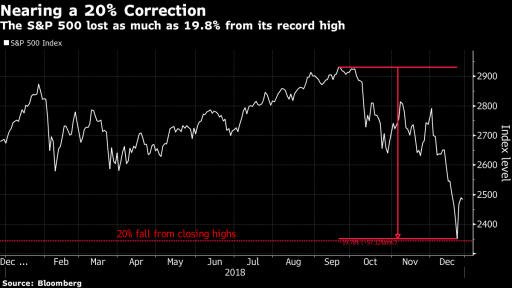- Home
- >
- Daily Accents
- >
- Humans, machines and financial markets. The new normal

Humans, machines and financial markets. The new normal

The list of "victims" in the financial markets in 2018 is long enough. Hedge funds, Amazon, Apple, trillion dollar movements and bad trading results. Even the Christmas spirit was not spared by aggressive stock market disbursements. A sale that feels like Armageddon, like the Rebellion of Machines, an unprecedented cataclysm. But this feeling seemed to make the situation more dramatic than it really was.
The fact that each sale within 20% brings pain. However, the current devaluation of acacia is far from unseen or unheard of if we talk about depth and speed of failure. Over the past 100 years, we have enough examples in which we can find enough situations for aggressive selling out of the order of what we have witnessed.
Marshall Front, founder of Front Barnett Advisers, says: "This process is inevitable, and it continues indefinitely."
Investors have time to reflect on events. Especially since the markets managed to avoid a fourth consecutive week of massive sell-offs. After Wednesday and Thursday, the markets managed to return with their strongest rally within one day of 2009, the damage the S & P500 suffered was limited to 15%.
"It's quite normal, but it's pretty much annoyed by all the market players after it's been talked about." - says Nancy Tengler, chief investment strategist at Tengler Wealth Management. "This will be a constant thorn in the eyes, and we have too much to concentrate on daily, minute and even second-hand movements.
In recent months, we have heard enough complaints and negative speeches about high-frequency traders and quantitative funds, who are the main accused of "whacking" that markets have suffered, especially since Christmas. Perhaps. These groups are quite large and in the search for guilty they are a comfortable victim. Finance Minister Mnuchin is one of those people who have doubts and have made the connection between recent releases and HFT groups.
However, these allegations against algo traders can hardly be imposed, and their opponents will have to find very strong evidence and arguments to support their accusations. The problem is that in the past there have been times of market crashes and without the help of algo traders. The crunch of 1929 is a very powerful example. However bad the current sale is, it is incomparable when talking about the crash of this period.
"The most serious market changes, expressed in percent, except in 1987, are in the 20s and 30s." - says Donald Selkin, Chief Market Strategist at Newbridge Securities Corp. "We also had a very strong and dramatic price collapse, and then there was not even e-commerce."
Dot - com Bust
Dot-com bubble. which has been booming since the late 1990s, broke out in March, 2000, when the S & P500 lost 35% of its value within two months. The NASDAQ Composite, which reached its peak on March 10 at 5,040.62 points, took 15 years to recover to that level.
Black Monday of 1987
In 1987, the S & P500 climbed 36% between January and August. So the index recorded almost the best year for the last three decades. Then in October, the massive sell-off led to a 31% decline in the index for only 15 days, with most of the sale going on in the fatal Monday.
1974 Sell - Off
The worst year for the S & P500 since 1937, the index fell 33% in 115 days due to slowing economic growth, rising unemployment and rising inflation. The shares subsequently rebounded from the bottom, accounting for more than 50% growth between October 1974 and July 1975.
1962 Rout
Инвеститорите, които са вече на възраст биха си спомнили 1962 г. S&P500 тогава е изгубил четвърт от стойността си в периода от март до юни 1962 г. Разгромът, още известен като "Kennedy Slide" се случил точно след като S&P500 нараснал със 79% за четири години. През следващите две десетилетия, индекса основно останал flat.
Not So Fat' 57
The downturn in car sales and the slowdown in the construction sector led to a dive in a 20% correction territory for 99 days in 1957. It was only a prelude before the onset of the economic recession, resulting in US gross domestic product shrunk by 10% in three months in 1958
Source: Bloomberg Finance L.P.
Graphs: Used with permission of Bloomberg Finance L.P.
 Trader Martin Nikolov
Trader Martin Nikolov Read more:
If you think, we can improve that section,
please comment. Your oppinion is imortant for us.



















